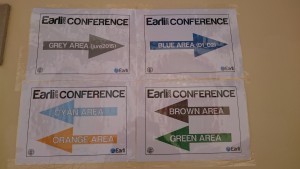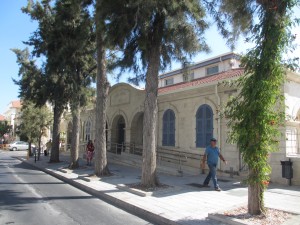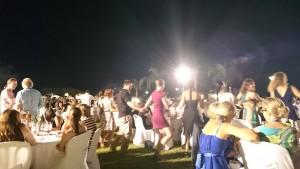
Just before our summerbreak, we uploaded the post ‘useful tips when attending a conference’. In this post several PhD-students from different universities in the Netherlands provided, as the title says, tips for when you are about to attend a conference. Just last week, I attended two European conferences together with some of my colleagues, the JURE (Junior Researchers conference) and the EARLI (European Association for Research on Learning and Instruction). In this blogpost I’ll reflect on how the tips from the post mentioned above helped me and expand on them further.
A good start is half the battle

Several tips were about preparation before attending the conference. Bas, for example, provided some tips on planning for your presentation. I can add to his tips a very important one: before starting to prepare your presentation, read the guidelines for your presentation carefully. Although this might sound very logical, I’ve seen people having prepared way too much text to present in the time assigned to them. Then they get nervous because the session does not exactly match their idea of it, and you wouldn’t want that to happen to you!!!
Another thing you should prepare for, is to be tired. Nienke and Jorine both stressed the importance of planning what sessions to go to and which to skip (in order to get some other work done and speak to other people). And I can only emphasize this tip. When the conference takes several days (JURE+EARLI was 7!! days) maybe you should try to only attend two sessions a day when actively participating in them. I personally tried three, sometimes four sessions a day and it was a lot. Currently I am in the process of looking back at my notes from last week, and honestly, some look unfamiliar to me. I know in time it will get back, but it really takes time to process it all. I would say, take it easy on yourself, focus on what you really want to get out of the conference and enjoy the rest, but don’t stress yourself.
Your bucketlist
Make one. If you intend to focus on what you want to get out of the conference, make sure you know what that is. Compile a list of clear and reachable goals which have a distinct beginning and ending. In this way you have some directions for yourself on what is most important to focus on. In addition, at the end of the conference you can evaluate easily how the conference went for you: reached all/most of your goals? You have all right to be very happy. Didn’t achieve all? What are the reasons for it? Not achieving your set goals, doesn’t mean you didn’t do well. It can be, of course, that when you finally get to the conference, you decide to take a different route. That’s fine too of course. I’m just saying that a list of goals might help you if you are the type of person that easily gets distracted or easily loses sight of what you have already done.
By the way, this also relates to the tips Daniël provided on meeting with people you want to meet. These meetings can be part of your goals. And having met these goals can also give you a very good feeling. At the EARLI I wanted to meet several people. Some pre-specified, but I also had the rather ‘fuzzy’ goal of ‘meeting new people’ (these could be anyone). And I did. I met with some people I had the intention of meeting and I met with new people I had not thought beforehand to meet up with. These people made EARLI even better, I had some good conversations with them. Both about research and about fun things.
Fun
Yeah, I was almost about to forget that. Don’t forget to have fun too. Most conferences have social events you can go to. Do so, as Nienke also advised. I’m not telling to go to all (although I did), as that can also be very tiring, but try to make it a goal to at least attend one. You will meet new people and get the chance to strengthen ties with people you already know.
During conference days you can also have fun. Just enjoy the presentations you attend, enjoy presenting your own research, enjoy the environment you’re in. Do it. Because that together with all the stuff you’ve learned, will make the conference a conference you will never forget.
🙂
I myself look back at a great JURE and EARLI conference. The colleagues I went with and got to stay together with in an accommodation, other PhD students from other universities I got to meet up with (again), my supervisors, and other researchers from all over the world, they all really helped making this experience for me a great experience. I learned a lot: both about (my) research and about myself. Hopefully can you, if you attended, recognize some of what I wrote. If you did not, hopefully this will help you in looking forward to your (first) international conference.







1 Comment